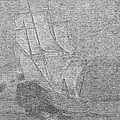34. Van Riebeek's Colony
"All the past we leave behind; We debouch upon a newer, mightier world, varied world. Fresh and strong the world we seize, world of labour and the march, Pioneers! O Pioneers!" —WALT WHITMAN.
The Dutch were now the chief carriers of the world, "waggoners of the sea," and their ships were constantly passing round the Stormy Cape on their way to and from Batavia. No longer did the Portuguese sail to and from the East as they had done of old. They had no Vasco da Gama, no Albuquerque, to lead them again to golden Goa. Portugal, once the pioneer of navi-gation, now lay quiet, nerveless, crushed, and she has never since risen to play any large part in the world's history. But the Dutch ships had much farther to go than had the Portuguese, and for some time past they had been in the habit of putting in to Table Bay, to take in fresh water on their long voyage to the East. These old Dutch ships, the quickest in the world then, took about 120 days, instead of twenty, to sail from Holland to the Cape. And they stood sorely in need of refreshment at the end of that time.
One day in the year 1649 a ship, the Haarlem,—one of the finest of Dutch ships,—was driven by a gale upon the beach at Table Bay. Her crew managed to save the cargo, but the ship became a total wreck. There was nothing to do now but to await the Dutch fleet, which would return shortly from Batavia. The crew under two men, Janssen and Proot, then explored the country, finally encamping on a site near the centre of the present city of Cape Town. They had saved some seeds and garden tools from the wreck, and soon a plot of ground was under cultivation. Cabbages, pumpkins, turnips, onions, and other vegetables grew splendidly; natives traded in friendship, bringing cattle and sheep; game fell to their guns, and fish was plentiful. Added to this, there was a stream of pure water, and the climate was delightful.
With the return fleet they sailed home to Holland to tell their countrymen of their experiment. A station was greatly needed somewhere in that region, and two years later a party of colonists left Holland to make a settlement on the shores of Table Bay. Jan van Riebeek was in command. He had been a great sailor and seen many countries, including the Cape. There were three ships, one of which was called the Goede Hoop, and on Christmas Day in the year 1651 the little fleet sailed for South Africa.
It was Sunday morning, April 7, that Van Riebeek and his colonists looked for the first time upon the site of their future home. A suitable spot for the new fort was soon chosen, and building began at once. The new fort, called Good Hope, was in the form of a square, with very thick walls of earth, round which was a moat. A square tower rose to some height, from which the defenders could fire down upon any enemy who might attempt to scramble up the banks of earth. They built a hospital, where sick men from the ships could be left to recover, and a cattle-kraal to enclose the cattle bought from the natives.
Such was the original fort Good Hope, built by the Dutch in 1652 as a half-way house between the mother country and the Far East.
Like all the other early colonists, Van Riebeek and his settlers were doomed to suffer. The cold stormy winter set in about May, the heavy rain poured through their tents, bringing sickness in its train, and soon, out of the original 116 men, only sixty were fit for work. They could get no fresh meat save hippopotamus. They were as solitary as the Pilgrim Fathers had been, thirty years before, on the shores of North America. But with spring dawned a new life. The grass began to grow. Hendrik Boom, the gardener, sowed his seeds, and soon there were plenty of fresh vegetables, green grass for the cattle and sheep, and fresh life for the home-sick colonists in news from Holland brought by passing ships.
One day—it was January 18, 1653—a ship came sailing hastily into Table Bay bringing the news that war had been declared between Holland and England. One can see the eager colonists crowding round the Dutch sea-captain as he told them all the news, for which they thirsted.
They knew there was no king in England at this time, but that the country was in the hands of a great man called Oliver Cromwell. It was this Cromwell who had now made the famous Navigation Act, which was aimed against Holland. It decreed that English ships alone might bring goods into England. Thus the trade of England would be increased, but at the expense of Holland, already supreme in the world of trade and commerce. So the long rivalry of the two sea-going nations had ended in a declaration of war. The little colony at the Cape must strengthen its garrison without delay, and the Dutch ship must sail on quickly to Batavia to warn the Dutch there of possible danger.
Meanwhile let us see what was really happening in England.

